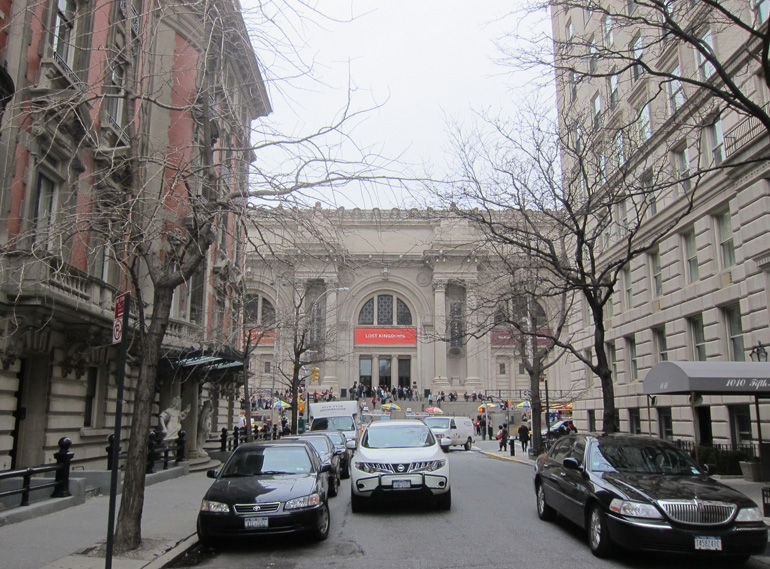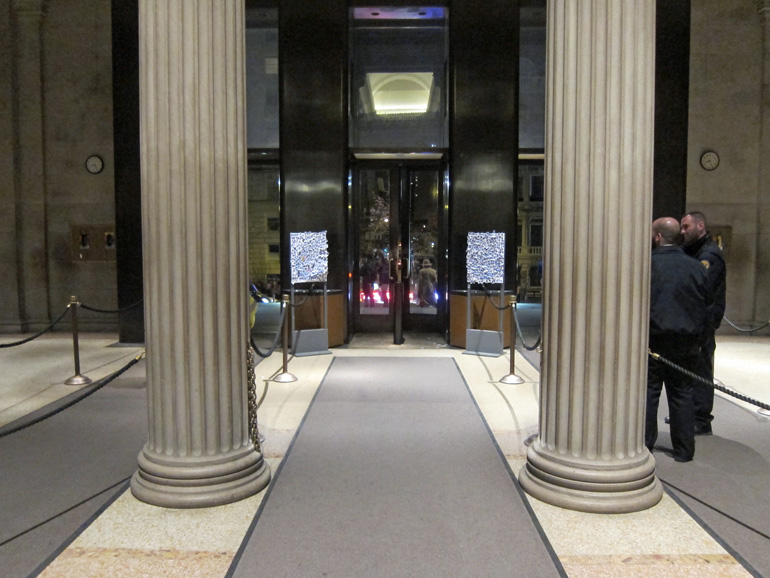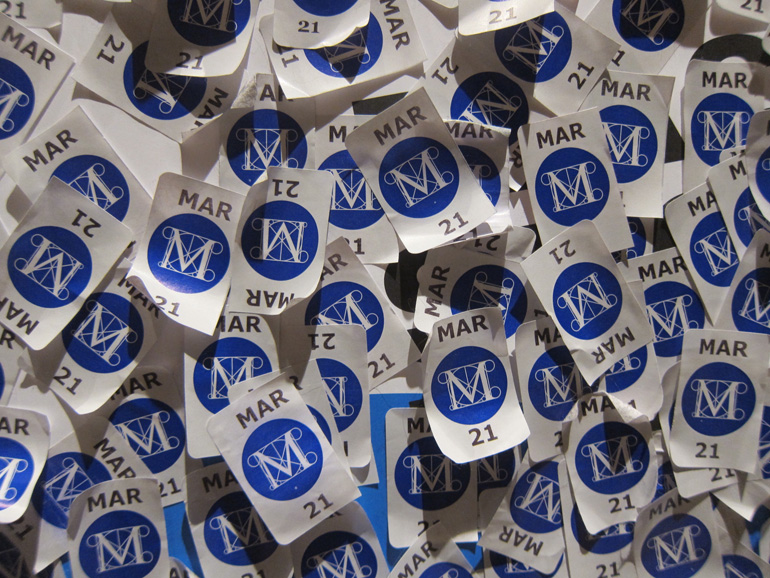
The Wallace Collection
Raise your hand if you have seen this picture before.
I’m going to assume that you know who the four men are. (Yes, that child in skirts is a little boy.) But do you know (a) who painted the picture (b) when? And (c) do you know who the lady is?
I knew who the lady was. Her name stuck in my mind when I learned it, because it is not the name that I assumed at first. “At first” being when I was thirteen, and reading Nancy Mitford’s The Sun King for the first time. The picture, slightly cropped, is given a double spread (or truck) toward the end of the book, with a portrait of the man in red’s wife on the reverse of one page and a picture of peasants by Louis le Nain on the reverse of the other. The painting is attributed to Nicolas de Largillière, and the lady is identified as the duchesse de Ventadour. “Who’s she?” I wondered. Surely it ought to have been Madame de Maintenon, Louis XIV’s secret wife — so I thought in my infancy.
And indeed it ought to have been that pious lady — which is why it wasn’t (because it couldn’t be), and why the picture is an astonishing fake.
***
I have been reading an historical novel. It’s in French. I don’t read historical novels in English, because they go in for a realism that does terrible things to the language — call it atrocity by anachronism. The French approach is (as usual) far more sensible. The overall narrative is precisely the sort of amiable recital of facts that Mitford made so entertaining — as nonfiction, mind. It is punctuated by occasional but always well-timed bursts of romance-fiction transport. French may not be the language of love, but it is the language of literary romance: there is a way to write about a pretty girl falling in love with a handsome young man, or vice versa, and, having mastered this art at about the time the Abbé Prévost published Manon Lescaut (1731), the French don’t fiddle with the formula. Chantal Thomas, in L’échange des princesses (2013) — a novel about the marriages of two princesses, one French and one Spanish, performed by proxy in 1721 — displays a genius for the genre. She quotes extensively from the plentiful documentary sources, orthographic irregularities intact, but she manages to inflect their stiffness with a certain irony, largely by having already told us what her characters, all of them based on actual people, really felt. It reads like history, but as told by Vanity Fair, if there were such a thing as Vanity Fair in French. You learn dozens of things on every page, but you’re much too engrossed to mind.
I am tempted to quote some of the lovey bits, but I resist. Some other time, perhaps. I want to stick with the painting, which, in answer to question (a), is no longer attributed to Nicolas de Largillière. The Wallace Collection, which ought to know, pins the label “French School” where the artist’s name ought to be. Painter unknown! This is not what makes the painting a fake, but it certainly indicates that it is!
The duchesse de Ventadour figures prominently in L’échange des princesses. The action begins about twelve years after the scene depicted in the painting might have occurred (fake!), but Mme de Ventadour, we are told, is “encore belle.” Now, I didn’t think that she was “belle” to begin with, but I’m willing to go along with the conceits of French romance. The duchesse accompanies one princess, twelve year-old Louise Élisabeth, daughter of the Regent, from Paris to the Spanish border (on an island in a river somewhere between St Jean de Luz and San Sebastián), where the girl is exchanged for the Infanta Maria Anna Victoria of Spain, daughter of Philip V and his “viperine” second wife, Elizabeth Farnese (as we call her), and a child not yet four years of age.
Setting out on the journey, Mme de Ventadour assures herself that there is no danger of falling in love a second time, but in this she is mistaken, for the little infanta immediately captures her heart. I suppose that this is why the lady is “beautiful”: her romance is not carnal but maternal. She has already raised the king of France, twelve year-old Louis XV, and had him snatched away when the time came for men to take over the education of the prince. Duchesse and king have been heartsick ever since!
Just as operatic love scenes work best in Italian, so it is with their prose equivalents in French. I wouldn’t dream of translating the scene in which the infanta, greeting her already very handsome future husband for the first time, immediately falls in love with him, while the king, who can tell at a glance that his “Maman Ventadour” has given her heart to her young charge, is paralyzed by jealousy. The music that lifts you out of your chair would be lost — it’s built into the language. In English, the scene would risk implausibility.
Suffice it to say that, until I began reading L’échange des princesses, I hadn’t given Mme de Ventadour much thought. But now I felt the hot knife of curiosity pressing against my neck. What was she doing in that picture?
Put it like this: find me another portrait of Louis XIV or any member of his family which features someone who is not. I have never seen, for instance, a portrait of Louis with any of his mistresses. Such a picture would have violated the rules not only of propriety but of portraiture: the portrait was an ideal representation from which all accidents, save those of fashion, were banished. Royalty could not be adulterated by the presence of non-royals.
In The Sun King, the picture is identified as “Louis XIV, with the Grand Dauphin, the Duc de Bourgogne and (supposedly) his second son, and the Duchesse de Ventadour.”
Here’s its title at the Wallace Collection: “Madame de Ventadour with Portraits of Louis XIV and his Heirs.”
As for the date of the painting: “1715-1720.”
Of course! Louis XIV died in 1715. His son, the Grand Dauphin, died in 1711. The Grand Dauphin’s son, the duc de Bourgogne, died in 1712, as did his wife and his elder son, all of measles. The younger son, the future Louis XV, was also infected, but he pulled through, under the care of “Maman Ventadour.” After the old king died, the duchesse must have felt at liberty to have her role in the preservation of the senior Bourbon line commemorated in fine style. The new king was too young to object, and his guardian, the reprobate duc d’Orléans, wouldn’t care. The result is more a conversation piece (a genre that would become wildly popular in England later in the century) than a court portrait — another giveaway.
If, dear reader, you happen to be a student of French history under the age of forty, you will probably have been laughing at me all the while, wondering how I could have been hoodwinked by this bald imposture. I can only reply that the day will come when you discover that some of the things that you learned in school were and are not true.
As for Madame de Maintenon, not only would she not have been shown in a painting with her secret husband, but she would have been guarding a quite different, and much older, child, a young man by this time — Louis’s adored but feckless bastard, the duc du Maine. That is another story.
Postscript
Ray Soleil, when he read the foregoing, asked, “What got you going?” What was it that brought what I facetiously called “the hot knife of curiosity” to my neck? As this seems to be the most interesting thing about my “discovery,” I thought that it deserved mention, and here, not in some other entry.
What made me look into the background of the picture was a strange combination of familiarity and experience. The picture it self really could not be more familiar. I cannot say that I memorized it, but when I remark that, before I got to the computer to start checking things out, I imagined Mme de Ventadour to be standing between the king’s chair and the duc de Bourgogne (and facing the opposite direction), that will only underscore how present the elements of the picture were to my mind. I cannot recall not knowing it. From the first moment of contact, it stood as an emblem of the ancien régime, perhaps the emblem. Here were four generations of Bourbons, at ease in their opulence, one of them on a leash held by a lady in long kid gloves. When I saw it for the first time, I was more familiar with the look of the Eighteenth Century than a healthy child of my age ought to have been, but I was innocent of all power of discrimination. I swallowed the painting as evidence.
Which, as we have seen, it is not; it is a confection. (I should like to have been a fly on the wall when the duchesse riffled through her old gowns, looking for something that said “1710.”) My acquaintance with a lot of other paintings from the period, alongside a great deal of writing about it, have built up in the more than fifty years since I saw this picture into a mass of experience. As I read Chantal Thomas’s book, the frequency of the name “Ventadour” elicited a certain sparking flash from this mass, an irritation, an interference, a sense not unlike the one produced by a frame’s hanging askew. Something was wrong. Presently this sense crystallized into the words with which I headed this entry. I realized that I had never seen another painting like Mme de Ventadour’s. The image no longer made sense, and indeed it turned out to be a fake: the picture, not of something that never happened, but of something that would never have been depicted with the consent of the powerful man who sits in the chair.
The authority of Madame de Ventadour’s fake, owing simply to its seniority in my experience, was immense, but not, I’m happy to say, fixed.
I’m sure that you’ve heard of “Mondegreens.” I’d herewith like to propose the term “Ventadour” for the experience of finding out the truth about something that was misunderstood long ago, when one was too young to appreciate it.





















